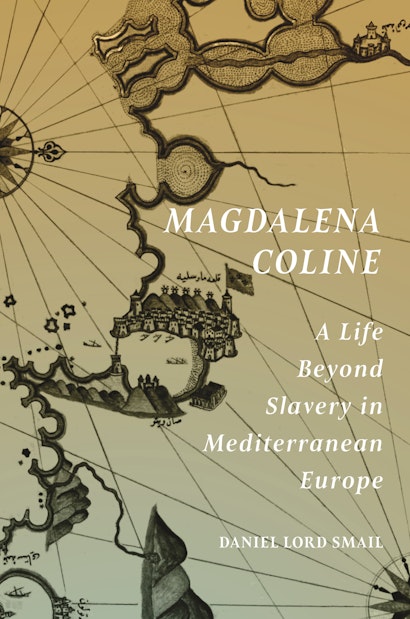In 1387, a young Muslim woman from North Africa was captured on a galley in the Bay of Naples and brought to Marseille as a slave. For more than ten years, she was held in bondage to a shipwright and privateer named Peire Huguet. Daniel Lord Smail tells the extraordinary story of Magdalena Coline, a woman who dared to file suit against the man who called himself her master, and whose passage from servitude to freedom raises tantalizing questions about how the people of her time made sense of slavery as a social category.
In a masterful narrative that takes readers from the waters of the Mediterranean to the court of the Angevin King Louis II, claimant to the throne of Naples, Smail describes how Peire, pressed by Magdalena’s supporters, reluctantly granted her a tacit manumission through her marriage to her first husband, whose death two years later placed her in a state of considerable ambiguity. In 1406, following her second marriage to an immigrant shoemaker, a dispute with Peire exploded in the law courts of Marseille, where it played out over two tumultuous years through numerous suits and appeals. In a dramatic turn of events, Magdalena traveled to the royal court in nearby Aix-en-Provence, where she successfully petitioned the king and returned home victorious.
Drawing on court records and an array of other archival sources from the period, Magdalena Coline brings these remarkable legal proceedings vividly to life, shedding new light on the ways slavery was understood and practiced in the late medieval Mediterranean world.
Daniel Lord Smail is Frank B. Baird, Jr., Professor of History at Harvard University. His books include Legal Plunder: Households and Debt Collection in Late Medieval Europe and The Consumption of Justice: Emotions, Publicity, and Legal Culture in Marseille, 1264–1423.
“Smail achieves something extraordinary in this book, giving us both a lapidary microhistory of the experiences of one woman and a broad, sweeping account of the dynamics of slavery, law, and economics in the later medieval Mediterranean. In a story that unfolds as grippingly as any modern courtroom drama, Magdalena acts as a lens through which we can view the wider northern Italian society around her while never losing sight of the shimmering light of humanity at its core.”—John H. Arnold, author of What Is Medieval History?
“A meaningful intervention in medieval social history and the history of slavery. By richly contextualizing a series of lawsuits brought by a formerly enslaved woman, Smail brings new analytical insight to their significance in the lives of the people involved and the legal and social frameworks within which they acted.”—Hannah Barker, author of That Most Precious Merchandise: The Mediterranean Trade in Black Sea Slaves, 1260–1500
“This is a dramatic and compelling account of the life of Magdalena Coline and her efforts to obtain legal victory against her former enslaver. It is a history that helps us to understand the essentially unknown nature of enslavement in early fifteenth-century Marseille while also bringing that city to life in incredibly vivid detail. A must-read.”—Sara McDougall, author of Royal Bastards: The Birth of Illegitimacy, 800–1230
“Smail’s insightful and capacious book traces Magdalena Coline’s remarkable trajectory from slavery to freedom, from Islam to Christianity, and from two marriages to economic well-being and the ability to shape her own life. Her gripping tale is a triumph of scholarship, a major original contribution by one of the leading and most versatile medievalists in the world today.”—Teofilo F. Ruiz, author of The Terror of History: On the Uncertainties of Life in Western Civilization
This publication has been produced to meet accepted Accessibility standards and contains various accessibility features including concise image descriptions, a table of contents, a page list to navigate to pages corresponding to the print source version, and elements such as headings for structured navigation. Appearance of the text and page layout can be modified according to the capabilities of the reading system.
Accessibility Features
-
WCAG v2.2
-
WCAG level AA
-
Table of contents navigation
-
Single logical reading order
-
Short alternative textual descriptions
-
Print-equivalent page numbering
-
Landmark navigation
-
Index navigation
-
Epub Accessibility Specification 1.1
-
ARIA roles provided
-
All non-decorative content supports reading without sight
-
No known hazards or warnings


